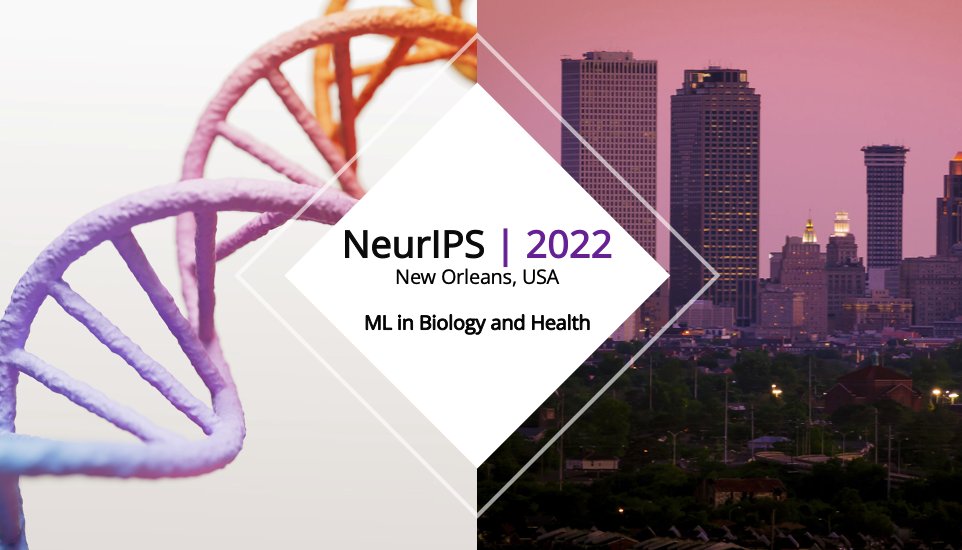
NeurIPS 2022 Health & Bio Conference Review
You couldn’t make it to NeurIPS in 2022?
Nothing to worry - I curated a summary for you below focussing on key papers, presentations and workshops in the buzzing space of ML in Biology and Healthcare.
Keynotes
Learning beyond Backpropoagation - Geoffrey Hinton
Back prop has become the workhorse in ML - Geoffrey Hinton challenges the community to rethink learning introducing the Forward-Forward Algorithm that are trained to have high goodness on positive and low goodness on negative samples.
An introduction to Conformal Prediction - Emmanuel Candès
Giving models an understanding of what they do not know, is for many decision-making applications as important as providing accurate predictions.
Emanuel Candès (Stanford University) gave a broad introduction to conformal prediction with quantile regression to filter out low confidence predictions.
Challenges, limitations and paths forward for Causal Inference - Peter Spirtes (CausalML workshop)
Causality is at the core of key problems in healthcare and is receiving more attn at NeurIPS:
In the causalML for real world impact workshop, causality pioneer Peter Spirtes (Carnegie Mellon University) outlines challenges, limitations and paths forward for causal inference-
Causal Inference - Stefan Bauer
Stefan Bauer (KTH Stockholm and CIFAR) presented a wealth of recent research on real-world uses of causal inference including single-cell gene network inference, learning neural causal models from perturbational data, and optimal experimental design for causal discovery.
Neural Causal Structure Learning - Rosemary Nan Ke
Deep learning for causality leader Rosemary Nan Ke (DeepMind) introduces us to Neural Causal Structure Learning - a synthesis of deep learning and causal discovery that promises flexibility and scalability to capture cause-effect relations with deep learning.
Causal ML for Drug Discovery - Jim Weatherall
In a following session, Jim Weatherall (AstraZeneca) makes a strong argument for causal ML in medicines development to enable a deeper understanding of mechanisms of therapies, and outlines some of the challenges faced by practitioners.
Causality in Biomedical Sciences - Caroline Uhler
Causality in biology leader Caroline Uhler (MIT) makes the case for the new methods needed to truly move towards causality in ML and introduces us to an impactful application to cancer immunotherapy for which a $USD 50’000 challenge has been opened.
De Novo Designed Proteins with ML - David Baker
In the AI for Science workshop, David Baker (University of Washington) gives us a whirlwind tour of the exciting progress in de novo protein design with ML incl the first approved de-novo designed medicine, amyloid binding, protein/NA complexes and RFdiffusion for unconditional generation
Recent Advances in Automated Material Synthesis - Connor Coley
In AI4Mat workshop, Connor Coley (MIT) presents recent advances in automated material synthesis that promise to lead to algorithmic “self-driving labs” that plan and execute synthesis experiments built on data-driven ML approaches.
ML for Intensive and Perioperative Care - Stephanie Hyland
Stephanie Hyland (Microsoft Research) tackles the challenging setting of using ML in intensive and perioperative care in her amazing time series for health workshop talk - providing an excellent outline of how to approach, specify, represent and act on interdisciplinary health/ML problems.
How to ask the right questions in ML for healthcare - Danielle Belgrave
In the same session, Danielle Belgrave (DeepMind) provides an excellent overview of how to ask the right questions, refine metrics, optimise data sampling, and to better understand the clinical context and big picture to truly advance ML for healthcare.
Conclusion
Overall, exciting observations are:
- the emerging synthesis of deep learning and causality
- the ongoing reinvention of the entire healthcare stack with a data-driven lens
- increasing bio/health presence, but (in contrast to ICML) still small vs vision and text at #NeurIPS2022
DISCLAIMER: The above list is a personal curation that most certainly missed many key contributions (in particular the many excellent posters!) and is only intended to be a starting point for your own exploration.